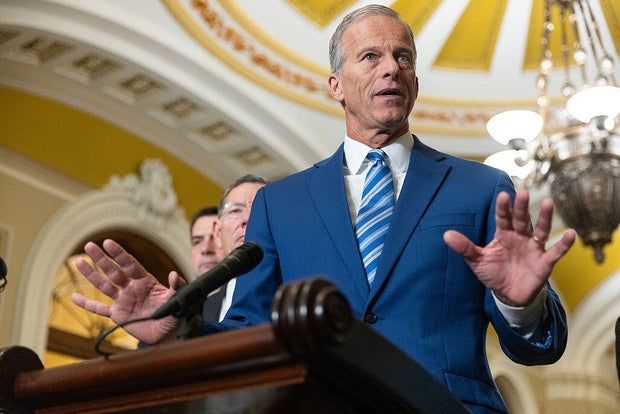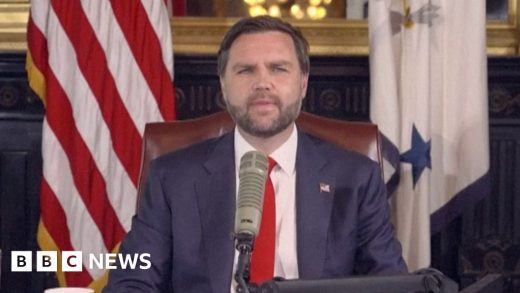Washington — The Senate is expected to vote Thursday on advancing an individual year-long appropriations bill to fund the Pentagon as GOP leaders pursue an alternative approach to restart some funding as the government shutdown has stretched into a third week.
Senate Majority Leader John Thune teed up consideration of the full-year Defense Department appropriations bill earlier this week, and the upper chamber is expected to take a procedural vote on advancing the measure Thursday afternoon.
The Senate has been locked in a stalemate in recent weeks, seeing no movement despite holding repeat votes on a short-term funding measure to reopen the government as Democrats demand an extension of expiring health insurance tax credits. And although the Senate is also set to vote for a tenth time on the House-passed measure to extend overall funding earlier on Thursday, the push to move forward with the Pentagon funding bill marks a change in approach as the shutdown wears on.
Because 60 votes are required to advance most legislation in the Senate, Republicans need support from across the aisle to reopen the government. And with 53 Republicans in the Senate, Democrat support will also be needed to advance the full-year Pentagon funding bill. How Democrats will vote remains to be seen.
When asked whether Democrats would support the Defense bill, Senate Minority Leader Chuck Schumer, a New York Democrat, said Wednesday that “we have to see what they’re going to put on the floor.” Although Democrats have been at odds with Republicans over how to keep the government funded in the short term, they have generally been supportive of work on the regular appropriations process. But whether they’re willing to take the focus off of their health care push, and the effort to reopen the government more broadly, is an open question.
Each year, Congress must pass legislation to fund the government. But the process often stretched late into the fiscal year, forcing lawmakers to pass stopgap measures to keep the government funded while they continue work on the 12 full-year appropriations bills. In recent years, Congress has resorted to grouping the funding measures together into large packages, known as omnibus bills. Those are often considered at the last minute before a deadline, pressuring lawmakers to support them and fund the government. Still, GOP leadership in Congress has been pushing to return to the way the appropriations process is intended to play out, with individual funding bills.
Thune, a South Dakota Republican, touted the regular-order appropriations process at a news conference Wednesday, while nodding to its bipartisan tradition.
Nathan Posner/Anadolu via Getty Images
“One of the things that Democrats and Republicans want to see is a normal appropriations process,” Thune said, noting that the Senate passed a handful of bills before the August recess that are available for conference with the House. “So that’s in the works.”
Thune said the Defense funding bill is “something that we ought to be moving forward on, and hopefully, if possible, we’d like to attach some other appropriations bills to it.”
“We’ll find out tomorrow whether the Democrats want to proceed to the Defense appropriations bill and what other bills we might be able to attach to it if we can get consent to do it,” Thune added.
Thune indicated to reporters earlier Wednesday that Senate Republicans are hoping to include a package of appropriations bills in a procedural vote. He said, “I think the goal is to see what the traffic will bear in terms of additional bills.”
“We would like to put together a package, like we did last time on the floor, which will take consent, and if we can get on Defense appropriations, which we’ll vote on tomorrow, then we can start that negotiation process,” he said.
The legislation would restore paychecks for members of the military, and it comes as President Trump directed the Pentagon to “use all available funds” to avoid service members missing their mid-month paychecks on Oct. 15. Still, the move hasn’t taken pressure off of lawmakers to reach a permanent solution, with Speaker Mike Johnson calling the administration’s move a “temporary fix.”


